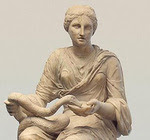The coronavirus pandemic has brought a fresh focus on personal habits; we all know the drill by now: wash hands with soap for 20 seconds, use hand sanitizer containing at least 60% alcohol and do not touch your face. These simple habits go a long way in protecting us from not just covid-19 but any infectious disease (something to remember next flu season!). Although it helps to be reminded, most people know the value of personal hygiene and its effect on health.
Infectious diseases were common in ancient times, and although the cause of such diseases was not well understood, the concept of hygiene was certainly associated with health. The word hygiene itself derives from Hygieia, the Greek goddess of health and cleanliness, who was the daughter of Asclepius, the god of medicine.
The Greeks had the theory of miasma that attributed diseases to bad air, which was really a primitive concept of hygiene. Hippocrates himself recommended patients to stay away from the airs, waters and places that contained dangerous miasmas thought to cause diseases. Ancient Greeks and Romans also enjoyed bathing rituals in elaborate public baths, where they used clay, pumice and ashes for cleaning, followed by application of olive oil. They also used Strigils or curved metal tools to scrape off sweat and grime from their bodies before entering the bath, so they knew that entering a common bath with your sweat was not cool. And way before the Greeks and Romans, the Egyptians were also practicing hygiene. As far back as 1500 BC, ancient Egyptians were using a soap like material to clean themselves.
Ancient civilizations also understood hygiene related to sewage. The Indus Valley civilization had a well established and functional sewage system. The Ancient Romans were also concerned about the disposal of sewage. They built the first public sewer, the Cloaca Maxima, in 600 BC, although it was a bit flawed because the same pipes carried sewage and the street drainage. The Cloaca Maxima dumped the city's wastes into the river Tiber outside the city limits.
The Romans were also concerned about the quality of drinking water. Shortly after the founding of Rome, the Romans built the first aqueduct, the Aqua Marcia, in 614 B.C. which carried fresh water from the mountains to the city of Rome. It contained the best quality of water and was used solely for drinking purposes.
Romans also understood the relation between hygiene and health. With the miasma theory firmly established, they recommended staying away from bad regions for health purposes. Roman scholar, Terentius Varro, recommended in his Book on Agriculture that houses should be built away from swamps because minute creatures that could not be seen by the eye bred there and caused diseases. Another author Columella also wrote that a swamp released a pestilential vapor in hot weather, and produced a swarm of harmful insects. Indirectly, they understood the idea of hygiene and its effect on health. So although they didn't know the exact causes of diseases as we do now, keeping good hygiene helped them ward off many diseases.
Infectious diseases were common in ancient times, and although the cause of such diseases was not well understood, the concept of hygiene was certainly associated with health. The word hygiene itself derives from Hygieia, the Greek goddess of health and cleanliness, who was the daughter of Asclepius, the god of medicine.
 |
| Statue of Hygieia. Image: Greek Mythology |
The Greeks had the theory of miasma that attributed diseases to bad air, which was really a primitive concept of hygiene. Hippocrates himself recommended patients to stay away from the airs, waters and places that contained dangerous miasmas thought to cause diseases. Ancient Greeks and Romans also enjoyed bathing rituals in elaborate public baths, where they used clay, pumice and ashes for cleaning, followed by application of olive oil. They also used Strigils or curved metal tools to scrape off sweat and grime from their bodies before entering the bath, so they knew that entering a common bath with your sweat was not cool. And way before the Greeks and Romans, the Egyptians were also practicing hygiene. As far back as 1500 BC, ancient Egyptians were using a soap like material to clean themselves.
Ancient civilizations also understood hygiene related to sewage. The Indus Valley civilization had a well established and functional sewage system. The Ancient Romans were also concerned about the disposal of sewage. They built the first public sewer, the Cloaca Maxima, in 600 BC, although it was a bit flawed because the same pipes carried sewage and the street drainage. The Cloaca Maxima dumped the city's wastes into the river Tiber outside the city limits.
The Romans were also concerned about the quality of drinking water. Shortly after the founding of Rome, the Romans built the first aqueduct, the Aqua Marcia, in 614 B.C. which carried fresh water from the mountains to the city of Rome. It contained the best quality of water and was used solely for drinking purposes.
 |
| Roman aqueduct to transport clean water to Rome |
Romans also understood the relation between hygiene and health. With the miasma theory firmly established, they recommended staying away from bad regions for health purposes. Roman scholar, Terentius Varro, recommended in his Book on Agriculture that houses should be built away from swamps because minute creatures that could not be seen by the eye bred there and caused diseases. Another author Columella also wrote that a swamp released a pestilential vapor in hot weather, and produced a swarm of harmful insects. Indirectly, they understood the idea of hygiene and its effect on health. So although they didn't know the exact causes of diseases as we do now, keeping good hygiene helped them ward off many diseases.
Comments
Post a Comment